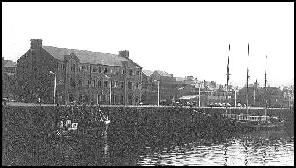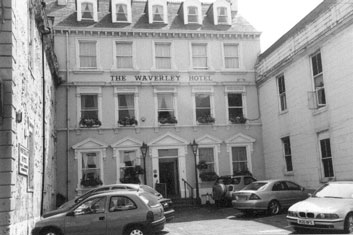
| Blencowe Families’ Association Newsletter | Vol. 18 No. 3 September 2003 |
During our short holiday in the Lake District last Spring I browsed through a book of local history that I found on-shelf at our hotel. It told that, in days gone by, the Port of Whitehaven had been second in importance only to London. In addition to the coal trade it had important connections with Virginia, especially for the importation of tobacco. This perhaps explained why Henry Blencowe had left Blencow Hall in the charge of a caretaker named Robert Crichton and taken over the post of Chief Collector of Customs.
The tobacco trade has long since moved to Bristol and, with the coal mines worked out, the coal trade has also disappeared. We decided to make a visit and found another reason for its rather a depressed state; the road along the cost from Barrow in Furness is scenically pleasant but is narrow and winding making for a slow journey. Not much tourist trade passes that way.

|
The port of Whitehaven today, the Customs House is on the left. The old sailing ship appears to be rusting away at her moorings, even the solitary fishing boat showed no sign of life. Tangier Street lies parallel to the wharf and one block behind the Customs House. |
Walking through Whitehaven I tripped and fell headlong on the sidewalk; fortunately only my dignity was injured. However, my Pentax bounced heavily and the picture I had taken of the harbour was the last from a camera that had accompanied me for twenty years through five continents. I had to ask Michael Baron, a local history enthusiast who lives nearby in Loweswater, to take pictures of Tangier House -- of which more below
Jill Dudbridge has told of Henry Blencowe's life in Chapter 11 of the Blencowe Book. He inherited Blencow Hall when only two years old and spent his childhood there in care of his mother. He attended Christ's College, Cambridge and became a Councillor-at-Law. At the age of twenty he married Dorothy Sissons who bore him seven children before her death in 1707. Three years later he was married again, to Elizabeth Todd by whom he had another four children.
He served as a Judge at the Quarter Sessions in Carlisle and was a Commissioner for the Poor. In 1711 he had leased Moston Hall in Penrith from Lord Dacre and seems to have been living in some style: the Bishop of Carlisle wrote that 'young Mr Blencowe' was in debt to the tune of £1,200.

|
|
Tangier House today, now the Waverley Hotel
(photo by Michael Baron). |
The move to Whitehaven probably helped restore Henry's fortunes for the Collectorship would have paid well and given plenty of opportunity for private profit (to put it politely!). In January 1716 he leased Tangier¹ House from Alfred Lawson, his predecessor in the Customs Office. The house, now the Waverley Hotel, is the only impressive building in Tangier Street and, at that time, was probably one of the most prestigious in the town. The lease mentions, in addition to the house, a brewhouse, cowhouse, storehouse and stable and included the lease of the 'Great Pew' in the Old Church at Whitehaven. The document is a bit confusing with some gaps; annual sums of £10, £14 and £21 are mentioned; whichever was charged it looks like good value!
On 20 March 1717 Henry's second wife Elizabeth Todd gave birth to a son Peter. A fascinating letter survives, tracked down by Jill Dudbridge and transcribed by Mike Walton. It concerns clothing for Elizabeth and the baby. It was dated 23 March and was from M. Pattenson, probably in Penrith:
Madam:
By yesterdays Carrier I sent a box directly to Mr Blencow, wherein is all the things you writ for, Except the whit mohaire, which I could not meet with, and my neices's gloves which I have not yet got from washing, & I feared to keep your things any longer, not knowing how soon they might be wanted, I shall send a box I beleive next week, to my sister Cockle, in which I will send my neices's gloves, & I hope she will find some way to get them from penrith, pray let me hear from you as soon as you receive the box, which I hope will come safe to you & be to your satisfaction. Mrs Hutton Desired to know if there was any difference in the Childs mantle, wore with an apron or without; all mantles are an ell² long, and a yard broad, and the difference we make is, if a boy we tye round his wast a broad white Ribbin like a sash, round a Childs tunick, & let it hang to the bottom of the mantle, and if a girle we put white knots from the bottom to meet with the bottom of the neckcloth, 2 bows & 2 ends in a knot, you will find in your boxes, the Charge of your head &tc: and your babys Cloths & inclosed is an account of the whole mony expended,
I am with all due respects,
your very Humble Servant
M. Pattenson
Then comes the bill:
| £: s: d | |
| paid for your head %c: | 7: 10: 6 |
| for the Childs Cloths as by bill | 3: 5: - |
| for a paire of Cloggs | 8: - |
| for Dying your Cloths | 10: - |
| for 2 paire of stockings Mr Hutton | 6: - |
| for washing of hoods | 2: 6 |
| 1 oz and ½ of silk for garters | 3: 6 |
| for washing 9 pair gloves | 3: - |
| paid Carriage of the box to town | 3: - |
| paid Coachire the pellmen[?] | 4: - |
| for a box Cord & porterage |
|
| 12: 18: 6 | |
| [Receiv]ed of this account 10: 15: - | |
| rests Due to me | 2: 3: 6 |
The cost of these items, and services and transport are very high compared with the cost of the house lease. With seven children by his first wife and four by his second, it is easy to see that Henry's debts did not all arise from riotous living! It is also good to see that Mr Pattenson had already received a substantial sum 'on account'!
¹The name of Tangier Street commemorates the cession of the territory to England as part of the dowry of Catherine of Braganza when she married Charles II in 1662.
²One ell was 45 inches in England (but only 37.2 in nearby Scotland).
| Blencowe Families’ Association | Newsletter Archive | Vol. 18 No. 3 September 2003 |